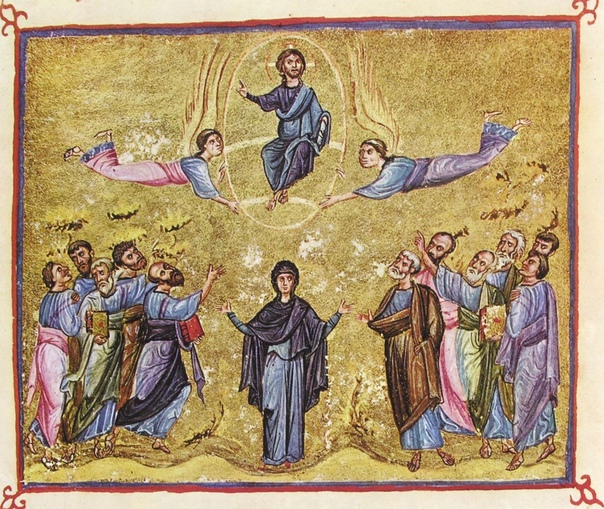Не Христос не хотел пребывать с апостолами видимо во веки, а мир, ненавидящий Христа, не мог вместить пребывания в нем Христа. Мир, ненавидя Христа, мог снова и снова осуждать Его на смерть. Мир не мог долее видеть Христа по причине своей неправды, которую и должен был обличить Дух Святой, пришедший в мир (Ин.16,8-10).
Грех, содеянный человеком, внес тление смерти, сделал невозможным вечное блаженство человека на земле. Тело, восприявшее семя тления, должно было разрушиться, умереть, потому что ''тление не наследует нетление'' (1Кор.15,50). Самый грех, бывший жалом смерти, ее источником, не мог уничтожиться без разрушения тленного тела, т. к. душа падшего человека как бы вся растворилась в плоти и плоть сделалась седалищем греха. И земля через грех человека стала жилищем тления, прилепив к себе сердце человека страстями, ею возбуждаемыми, а потому ''земля и все дела на ней'' должны некогда сгореть, стихии растаять, разрушиться, чтобы явились новое небо и новая земля (2Пет.3,10-13), жилище праведных.
Сначала должен был оторваться от пристрастий земных дух человека, потому что в нем начало греха. Должно было возвыситься к Богу и сердце. Когда же будет уничтожен грех, тогда и тело может стать нетленным и духовным, способным к обитанию на небе.
На небе через Свое Вознесение приготовил место человеку Христос. Говорил Он, что у Отца Его ''обителей много'' и что ''лучше'' Ему пойти и приготовить там место верующим и любящим Его, чтобы и они были там, где Он (Ин.14,2-3;16,7). Для отрешения человека от страстей земных и введения в горние обители претерпел Господь смерть, Воскрес и Вознесся на небо. По Вознесении Его дело спасения человека продолжает совершать Дух Святый, посланный Им в мир, очищающий от греха, дарующий жизнь духовную человеку. Пребывая сначала с людьми во плоти, чтобы ввести их в общение с Богом, начальное, видимое, Христос по Воскресении является ученикам лишь по временам, и в теле, уже одухотворенном, как бы устраивая переход от видимого общения к духовному. По Вознесении же Он вводит людей в духовное общение с Собой во Святом Духе. Вот тайна радости святых апостолов после Вознесения Господа, причина, по которой скорбь разлучения с Господом превратилась в великую радость вечного духовного общения с Ним в Святом Духе. Через веру эта радость входит в сердца любящих Христа, как вошла в сердца апостолов.
Прославим же Христа, обещавшего и по Вознесении пребывать с нами до скончания века, продолжающего нас видеть, слышать, являть себя различным образом, оставляя ощутительные, осязаемые следы своего невидимого пребывания в нашей жизни, творя все новое в ней (Апок.21,5).
Св. Фаддей Успенский
Грех, содеянный человеком, внес тление смерти, сделал невозможным вечное блаженство человека на земле. Тело, восприявшее семя тления, должно было разрушиться, умереть, потому что ''тление не наследует нетление'' (1Кор.15,50). Самый грех, бывший жалом смерти, ее источником, не мог уничтожиться без разрушения тленного тела, т. к. душа падшего человека как бы вся растворилась в плоти и плоть сделалась седалищем греха. И земля через грех человека стала жилищем тления, прилепив к себе сердце человека страстями, ею возбуждаемыми, а потому ''земля и все дела на ней'' должны некогда сгореть, стихии растаять, разрушиться, чтобы явились новое небо и новая земля (2Пет.3,10-13), жилище праведных.
Сначала должен был оторваться от пристрастий земных дух человека, потому что в нем начало греха. Должно было возвыситься к Богу и сердце. Когда же будет уничтожен грех, тогда и тело может стать нетленным и духовным, способным к обитанию на небе.
На небе через Свое Вознесение приготовил место человеку Христос. Говорил Он, что у Отца Его ''обителей много'' и что ''лучше'' Ему пойти и приготовить там место верующим и любящим Его, чтобы и они были там, где Он (Ин.14,2-3;16,7). Для отрешения человека от страстей земных и введения в горние обители претерпел Господь смерть, Воскрес и Вознесся на небо. По Вознесении Его дело спасения человека продолжает совершать Дух Святый, посланный Им в мир, очищающий от греха, дарующий жизнь духовную человеку. Пребывая сначала с людьми во плоти, чтобы ввести их в общение с Богом, начальное, видимое, Христос по Воскресении является ученикам лишь по временам, и в теле, уже одухотворенном, как бы устраивая переход от видимого общения к духовному. По Вознесении же Он вводит людей в духовное общение с Собой во Святом Духе. Вот тайна радости святых апостолов после Вознесения Господа, причина, по которой скорбь разлучения с Господом превратилась в великую радость вечного духовного общения с Ним в Святом Духе. Через веру эта радость входит в сердца любящих Христа, как вошла в сердца апостолов.
Прославим же Христа, обещавшего и по Вознесении пребывать с нами до скончания века, продолжающего нас видеть, слышать, являть себя различным образом, оставляя ощутительные, осязаемые следы своего невидимого пребывания в нашей жизни, творя все новое в ней (Апок.21,5).
Св. Фаддей Успенский
It was not Christ who did not want to abide with the apostles apparently forever, and the world, who hated Christ, could not accommodate Christ's presence in him. The world, hating Christ, could again and again condemn Him to death. The world could not see Christ longer because of its unrighteousness, which the Holy Spirit, who had come into the world, should have exposed it (John 16: 8-10).
Sin committed by man brought corruption to death, made impossible the eternal bliss of man on earth. The body that received the seed of corruption must have collapsed, died, because '' corruption does not inherit incorruption '' (1 Cor. 15.50). Sin itself, which was the sting of death, its source, could not be destroyed without destroying the corruptible body, because the soul of a fallen man seemed to dissolve in the flesh and the flesh became the seat of sin. And the earth, through the sin of man, became the dwelling of corruption, sticking the human heart to itself with the passions that aroused it, and therefore `` the earth and all things on it '' must once burn out, the elements melt, collapse, so that a new heaven and a new earth appear (2 Pet. 3,10-13), the home of the righteous.
First, the spirit of man had to tear himself away from the attachments of the earthly, because in him the beginning of sin. It was to be exalted to God and the heart. When sin is destroyed, then the body can become incorrupt and spiritual, capable of living in heaven.
In heaven, through His Ascension, Christ prepared a place for man. He said that His Father had many “dwellings” and that it was “better” for Him to go and prepare a place for those who believe and love Him, so that they would be where He is (John 14: 2–3; 16, 7). In order to deprive a man of the passions of the earth and introduce him into the highlands, the Lord suffered death, Risen, and ascended into heaven. Upon Ascension, His work of saving man continues to be performed by the Holy Spirit, sent by Him to the world, cleansing from sin, giving spiritual life to man. Staying first with people in the flesh in order to bring them into fellowship with God, the initial, visible, Christ by Resurrection appears to the disciples only at times, and in a body that is already spiritualized, as if arranging a transition from visible to spiritual communication. Upon Ascension, He brings people into spiritual fellowship with Him in the Holy Spirit. This is the secret of the joy of the holy apostles after the Ascension of the Lord, the reason why the grief of separation from the Lord turned into the great joy of eternal spiritual communion with Him in the Holy Spirit. Through faith, this joy enters the hearts of those who love Christ, as it entered the hearts of the apostles.
But we will glorify Christ, who promised to remain with us after the Ascension until the end of the century, continuing to see, hear, and reveal himself in various ways, leaving tangible, tangible traces of his invisible stay in our life, creating everything new in it (Apoc. 21.5) .
St. Thaddeus of the Assumption
Sin committed by man brought corruption to death, made impossible the eternal bliss of man on earth. The body that received the seed of corruption must have collapsed, died, because '' corruption does not inherit incorruption '' (1 Cor. 15.50). Sin itself, which was the sting of death, its source, could not be destroyed without destroying the corruptible body, because the soul of a fallen man seemed to dissolve in the flesh and the flesh became the seat of sin. And the earth, through the sin of man, became the dwelling of corruption, sticking the human heart to itself with the passions that aroused it, and therefore `` the earth and all things on it '' must once burn out, the elements melt, collapse, so that a new heaven and a new earth appear (2 Pet. 3,10-13), the home of the righteous.
First, the spirit of man had to tear himself away from the attachments of the earthly, because in him the beginning of sin. It was to be exalted to God and the heart. When sin is destroyed, then the body can become incorrupt and spiritual, capable of living in heaven.
In heaven, through His Ascension, Christ prepared a place for man. He said that His Father had many “dwellings” and that it was “better” for Him to go and prepare a place for those who believe and love Him, so that they would be where He is (John 14: 2–3; 16, 7). In order to deprive a man of the passions of the earth and introduce him into the highlands, the Lord suffered death, Risen, and ascended into heaven. Upon Ascension, His work of saving man continues to be performed by the Holy Spirit, sent by Him to the world, cleansing from sin, giving spiritual life to man. Staying first with people in the flesh in order to bring them into fellowship with God, the initial, visible, Christ by Resurrection appears to the disciples only at times, and in a body that is already spiritualized, as if arranging a transition from visible to spiritual communication. Upon Ascension, He brings people into spiritual fellowship with Him in the Holy Spirit. This is the secret of the joy of the holy apostles after the Ascension of the Lord, the reason why the grief of separation from the Lord turned into the great joy of eternal spiritual communion with Him in the Holy Spirit. Through faith, this joy enters the hearts of those who love Christ, as it entered the hearts of the apostles.
But we will glorify Christ, who promised to remain with us after the Ascension until the end of the century, continuing to see, hear, and reveal himself in various ways, leaving tangible, tangible traces of his invisible stay in our life, creating everything new in it (Apoc. 21.5) .
St. Thaddeus of the Assumption

У записи 12 лайков,
1 репостов,
266 просмотров.
1 репостов,
266 просмотров.
Эту запись оставил(а) на своей стене Вероника Вовденко
































